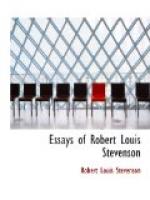Wordsworth[17] should perhaps come next. Every one has been influenced by Wordsworth, and it is hard to tell precisely how. A certain innocence, a rugged austerity of joy, a night of the stars, “the silence that is in the lonely hills,” something of the cold thrill of dawn, cling to his work and give it a particular address to what is best in us. I do not know that you learn a lesson; you need not—Mill did not—agree with any one of his beliefs; and yet the spell is cast. Such are the best teachers: a dogma learned is only a new error—the old one was perhaps as good; but a spirit communicated is a perpetual possession. These best teachers climb beyond teaching to the plane of art; it is themselves, and what is best in themselves, that they communicate.
I should never forgive myself if I forgot The Egoist. It is art, if you like, but it belongs purely to didactic art, and from all the novels I have read (and I have read thousands) stands in a place by itself. Here is a Nathan for the modern David;[18] here is a book to send the blood into men’s faces. Satire, the angry picture of human faults, is not great art; we can all be angry with our neighbour; what we want is to be shown, not his defects, of which we are too conscious, but his merits, to which we are too blind. And The Egoist[19] is a satire; so much must be allowed; but it is a satire of a singular quality, which tells you nothing of that obvious mote, which is engaged from first to last with that invisible beam. It is yourself that is hunted down; these are your own faults that are dragged into the day and numbered, with lingering relish, with cruel cunning and precision. A young friend of Mr. Meredith’s (as I have the story) came to him in an agony. “This is too bad of you,” he cried. “Willoughby is me!” “No, my dear fellow,” said the author; “he is all of us.” I have read The Egoist five or six times myself, and I mean to read it again; for I am like the young friend of the anecdote—I think Willoughby an unmanly but a very serviceable exposure of myself.
I suppose, when I am done, I shall find that I have forgotten much that was most influential, as I see already I have forgotten Thoreau,[20] and Hazlitt, whose paper “On the Spirit of Obligations” was a turning-point in my life, and Penn, whose little book of aphorisms had a brief but strong effect on me, and Mitford’s Tales[21] of Old Japan, wherein I learned for the first time the proper attitude of any rational man to his country’s laws—a secret found, and kept, in the Asiatic islands. That I should commemorate all is more than I can hope or the Editor could ask. It will be more to the point, after having said so much upon improving books, to say a word or two about the improvable reader. The gift of reading, as I have called it, is not very common, nor very generally understood. It consists, first of all, in a vast intellectual endowment—a free grace, I find I must call it—by which




